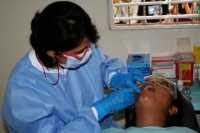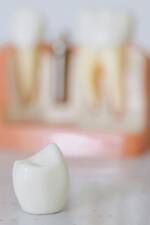Are you missing a tooth?
If you have lost a tooth, don't worry; you're not alone! Many people lose teeth due to accidents, tooth decay, or gum disease. But did you know that options are available to replace a missing tooth?
Do you know the options available to replace a missing tooth?
Yes, there are a few options to replace a missing tooth. One standard option is a dental implant. Another option is a dental bridge, where a false tooth is attached to the teeth on either side of the gap. There are also partial or complete dentures and removable replacements for missing teeth.
(more…)
Dental Research, Lifestyle & Health / 25.05.2024
Everyone Can Have a Healthy Smile: Practical Tips for Optimal Oral Health
 Table of Contents
Table of Contents
- The Importance of Oral Health
- Routine Dental Checkups
- Proper Brushing and Flossing Techniques
- The Impact of Diet on Oral Health
- Lifestyle Choices Affecting Oral Health
- Benefits of Preventative Care
Dental Research / 27.07.2023
Fluoride-Free Toothpaste Is Just As Good As Fluoridated Toothpaste, New Study Reveals
This article is for informational purposes only and is not a substitute for professional medical advice, diagnosis or treatment. Contact a qualified dentist or medical professional before engaging in any physical activity, or making any changes to your dental program, diet, medication or lifestyle,
For years, medical research has found that fluoride in toothpaste helps to prevent tooth decay and protect against cavities. As a result, most toothpastes contain between 1,000 to 1,100 mg/L of sodium fluoride or monofluorophosphate. But a new study has found that fluoride-free toothpaste is just as effective at preventing cavities as fluoride-based toothpaste. So, does this mean the end of using toothpaste enhanced with fluoride?
The study’s key findings
 Poznan University of Medical Sciences carried out a study involving 171 participants over a period of 18 months. The participants were split into two groups. One group used hydroxyapatite (fluoride-free) toothpaste and the other group used fluoridated toothpaste throughout the study. Six-monthly trips to a dental clinician were completed and a DIAGNOcam device and plaque-disclosing solution were used to check for signs of cavities and plaque. The end results revealed that almost 90% of people in both groups had no new cavities, which indicates that both hydroxyapatite toothpaste and fluoridated toothpaste keep cavities at bay.
Poznan University of Medical Sciences carried out a study involving 171 participants over a period of 18 months. The participants were split into two groups. One group used hydroxyapatite (fluoride-free) toothpaste and the other group used fluoridated toothpaste throughout the study. Six-monthly trips to a dental clinician were completed and a DIAGNOcam device and plaque-disclosing solution were used to check for signs of cavities and plaque. The end results revealed that almost 90% of people in both groups had no new cavities, which indicates that both hydroxyapatite toothpaste and fluoridated toothpaste keep cavities at bay.
Author Interviews, Dental Research / 01.07.2021
Wisdom Teeth Removal Linked to Long Term Improvement in Taste
MedicalResearch.com Interview with:
Dane Kim, Dental Student
University of Pennsylvania School of Dental Medicine
MedicalResearch.com: What is the background for this study?
Response: This large study was inspired, in part, by a previous publication, Gustatory Function After Third Molar Extraction (Shafer et al. 1999), which examined the effect of third molar extractions on human taste function. Their work was based upon more severe extractions and followed patients only up to six months after their surgery. Studies examining taste function over a longer period, i.e., beyond six months from the surgery, were non-existent.
The Smell and Taste Center of Penn Medicine, which is the only center of its type in the United States, has a large unique database of patients who have been thoroughly tested for both smell and taste function. This provided us with the opportunity to compare data from hundreds of persons who had previously received third-molar extractions to those who had not received such extractions. Importantly, the extracts had occurred years before thee taste testing. (more…)
Author Interviews, Dental Research, Pain Research, University of Pittsburgh / 03.05.2018
Are Opioids Effective for Dental Pain?
MedicalResearch.com Interview with:
 Paul A. Moore, DMD, PhD, MPH
School of Dental Medicine
University of Pittsburgh
MedicalResearch.com: What is the background for this study? What are the main findings?
Response: Effective pain management is a priority in dental practice. Government and private agencies highlight the need to provide optimal pain relief, balancing potential benefits and harms of both opioid and nonopioid analgesic agents. The purpose of our study is to summarize the available evidence on the benefits and harms of analgesic agents, focusing on preexisting systematic reviews.
We found combinations of ibuprofen and acetaminophen as having the highest association with treatment benefit in adult patients and the highest proportion of adult patients who experienced maximum pain relief. Diflunisal, acetaminophen, and oxycodone were found to have the longest duration of action in adult patients. Medication and medication combinations that included opioids were among those associated most frequently with acute adverse events in both child and adult-aged patient populations.
(more…)
Paul A. Moore, DMD, PhD, MPH
School of Dental Medicine
University of Pittsburgh
MedicalResearch.com: What is the background for this study? What are the main findings?
Response: Effective pain management is a priority in dental practice. Government and private agencies highlight the need to provide optimal pain relief, balancing potential benefits and harms of both opioid and nonopioid analgesic agents. The purpose of our study is to summarize the available evidence on the benefits and harms of analgesic agents, focusing on preexisting systematic reviews.
We found combinations of ibuprofen and acetaminophen as having the highest association with treatment benefit in adult patients and the highest proportion of adult patients who experienced maximum pain relief. Diflunisal, acetaminophen, and oxycodone were found to have the longest duration of action in adult patients. Medication and medication combinations that included opioids were among those associated most frequently with acute adverse events in both child and adult-aged patient populations.
(more…)
 Paul A. Moore, DMD, PhD, MPH
School of Dental Medicine
University of Pittsburgh
MedicalResearch.com: What is the background for this study? What are the main findings?
Response: Effective pain management is a priority in dental practice. Government and private agencies highlight the need to provide optimal pain relief, balancing potential benefits and harms of both opioid and nonopioid analgesic agents. The purpose of our study is to summarize the available evidence on the benefits and harms of analgesic agents, focusing on preexisting systematic reviews.
We found combinations of ibuprofen and acetaminophen as having the highest association with treatment benefit in adult patients and the highest proportion of adult patients who experienced maximum pain relief. Diflunisal, acetaminophen, and oxycodone were found to have the longest duration of action in adult patients. Medication and medication combinations that included opioids were among those associated most frequently with acute adverse events in both child and adult-aged patient populations.
(more…)
Paul A. Moore, DMD, PhD, MPH
School of Dental Medicine
University of Pittsburgh
MedicalResearch.com: What is the background for this study? What are the main findings?
Response: Effective pain management is a priority in dental practice. Government and private agencies highlight the need to provide optimal pain relief, balancing potential benefits and harms of both opioid and nonopioid analgesic agents. The purpose of our study is to summarize the available evidence on the benefits and harms of analgesic agents, focusing on preexisting systematic reviews.
We found combinations of ibuprofen and acetaminophen as having the highest association with treatment benefit in adult patients and the highest proportion of adult patients who experienced maximum pain relief. Diflunisal, acetaminophen, and oxycodone were found to have the longest duration of action in adult patients. Medication and medication combinations that included opioids were among those associated most frequently with acute adverse events in both child and adult-aged patient populations.
(more…)


